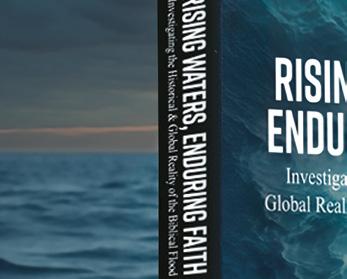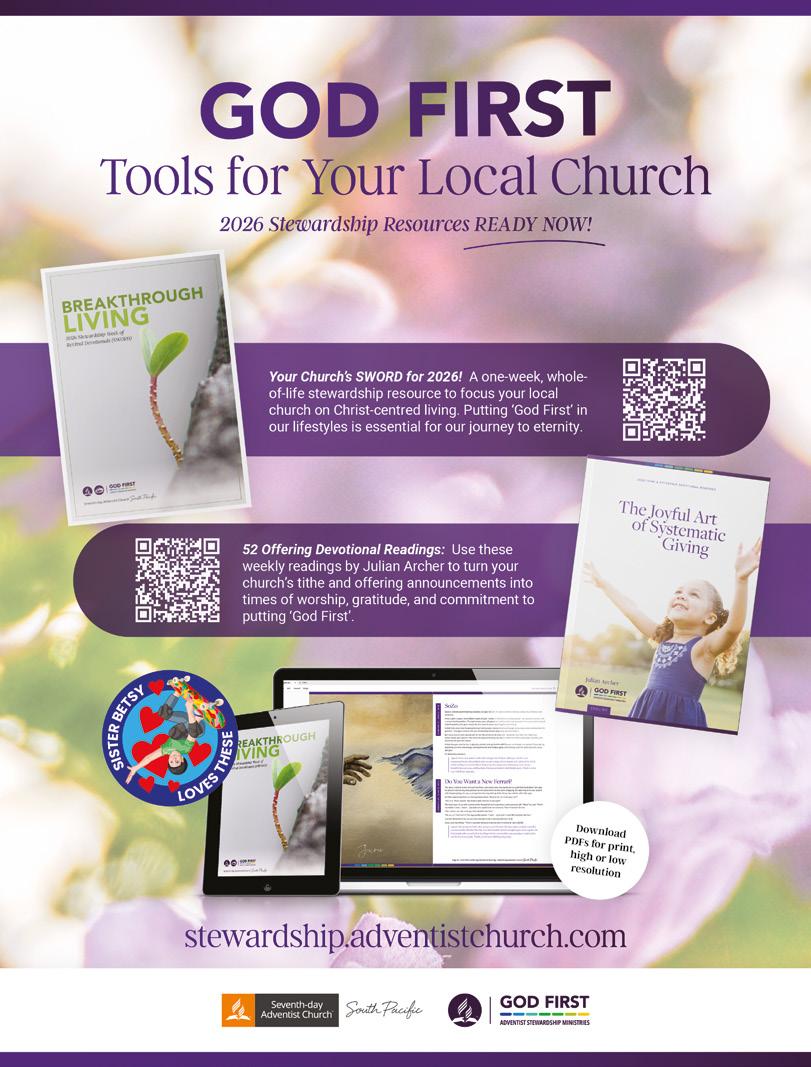

Daniel: Learning to wait on God's timing
Fulton transitions to university status
Adventist Record | November 1, 2025 ISSN 0819-5633



EDITOR’S NOTE: Eager and ready for mission
Jarrod Stackelroth Editor
God doesn’t need experts; He needs those who are willing to get out of their comfort zones and follow His leading.
I remember Net ’99. Yes, I’m that old. At the time it was touted as the biggest evangelism program for the Church. Churches got satellite dishes, prepared to invite people from the community and tuned in together across the world (not quite at the same time, due to time zones), and listened as Pastor Dwight Nelson from Andrews University at the time, presented the gospel and the Adventist message in a clear, passionate, Jesus-filled way.
I was a teenager at the time, and my family attended almost every night, so I achieved the grand prize of that black New King James Bible that was given out to attendees who came to enough of the programs. Somewhere over the years, I lost that Bible. But I still remember the impact of the program—it was a foundational experience for my growing faith.
It was also exciting for the Church. With the satellite technology, it was perhaps the first time the world had been able to access the same evangelistic program at the same time. In the 27 years since then, the internet has become almost universally accessible, smart phones and social media have been invented, and the world of technology and outreach has changed.
Last year, I was privileged to attend the PNG for Christ program—the biggest evangelistic effort in terms of scale and member involvement in the South Pacific, probably ever.
I’ve heard the arguments. That it is easy to do outreach in places like Papua New Guinea. It won’t work in other countries. But let me appeal to my brothers and sisters in Australia and New Zealand for a moment. Every time I travel to PNG, I come home inspired in my faith. The people there are dedicated church members. They did an enormous amount of praying and fasting in the lead up to the program. One teacher quit his job two years before the program to organise the series for his church. There was nurture and small groups to prepare the soil. Yes, we hear about issues with retention and “backsliding” but that is happening everywhere, and PNG is innovating in member retention discipleship. It is not that PNG is easier but that the harvest is ripe and the workers are eager and ready.
For the next five years, the South Pacific Division is planning an ambitious program of mission. SPD for Christ will provide training and equipping next year, while Trans Pacific Union Mission for Christ is also scheduled for 2026. Then New Zealand Pacific Union for Christ in 2027, Australia for Christ in 2028 and finally, PNG for Christ in 2029 for the second time. All our unions will be a focal point, and cross-collaboration and mission learning will happen in each region that will support the others. While some might be cynical, especially in our Western, post-Christian cultures, let’s keep an open mind, pray for the Holy Spirit to work and allow ourselves to be surprised. My prayer for my country and my wife’s country of New Zealand is that we can humble ourselves, pray and develop Spirit-led methods that are culturally relevant and effective in reaching people. I truly believe that if we seek God’s guidance in this, we will be surprised at how He goes before us and brings people to us who are seeking and ready to accept Him.
It may take different and innovative methods. It may look different in each region of the South Pacific. But let’s join together in praying for each union each year and in preparing our own lives and hearts to be ready to share our faith in intentional ways with our neighbours, friends, family and those in our community. God doesn’t need experts; He needs those who are willing to get out of their comfort zones and follow His leading.
SPD for Christ could be your own opportunity to be involved in a missionary endeavour. Ask your pastor, find out what your conference or mission is planning and find ways to get involved. If every member prayed and told God they were willing, He could change the world.

A renewed mandate
Glenn Townend South Pacific Division president
You don’t have to listen to Pastor Erton Köhler, the new General Conference president, long before you hear him say that as a movement, the Seventh-day Adventist Church is grounded in the Bible and focused on mission. I have noticed that those working closely with him are also using the same words. It’s a renewed mandate.
I’m reading through the words of the prophet Jeremiah now. Jeremiah, unlike many prophets, gives insight into his thoughts and feelings as he shares God’s messages to the morally failing kingdom of Judah during the 6th century. He reminds people that their idolatry will destroy them. They are violent and greedy and do not care for the oppressed—orphans, widows and foreigners. They are also sacrificing their children to foreign gods. As a young priest and prophet, even his relatives and friends opposed his warnings. They plotted against him, burnt his prophetic scripts, threw him in a dry well and sang mocking songs about him. Being a prophet was not easy. In one of these times that Jeremiah is sharing the challenge of his mission he writes, “But if I say I’ll never mention the Lord or speak His name, his word burns in my heart like a fire. It is like a fire in my bones! I am worn out trying to hold it in! I can’t do it” (Jeremiah 20:9 NLT).
Jeremiah is clear: he can focus on his challenging mission because the Word of God is within. Jeremiah is grounded in the Bible and focused on mission. The two go hand in hand. If we are grounded in the Bible, we will meet the God of the Bible who calls us to a life of purpose.
The Seventh-day Adventist Church has no mission if it is not grounded in the Bible. If we do not know God and His truth, we have nothing to say of value. If we do not know our identity in Jesus, we have no-one to share. If we are not united in the Spirit, our mission is weak. All can be involved in mission because we have a message from God direct from the Bible.
Each GC executive committee member received a gift—a perspex sphere on a stand featuring an open Bible at the base and the globe in the centre. Engraved on the stand are the words, “Grounded in the Bible and Focused on Mission”. I’ve placed mine on my desk. However, being grounded in the Bible and focused on mission is more than a desk ornament—it is a mandate for me and you as disciples of Jesus.

New church for neurodiverse families
Perth, WA
| Tracey Bridcutt
A unique new Seventh-day Adventist congregation has launched in Perth, Western Australia—a church designed specifically to support neurodiverse families.
Sensational Church, led by Pastor Vikram Panchal and his wife Leah, was born out of their personal journey raising a son diagnosed with autism and attention-deficit hyperactivity disorder (ADHD).
“Sensational Church exists to create a sensational, positive and hope-filled experience for both neurodiverse and neurotypical kids,” Pastor Panchal shared. “We want to demonstrate that with Christ, every child can reach their full potential.
“This is a vital need in our community right now. Rates of autism and ADHD are sky-rocketing. I can see multiple Sensational churches popping up across WA to bring hope to families right where they live.”
At the opening service on Sabbath, September 20, more than 20 children attended with their families, several of whom had discovered the church through Facebook.
“With more than 20 kids present, the place was buzzing!” Pastor Panchal said. “Families gave overwhelmingly positive feedback, telling us they hadn’t been able to attend church for years, but now they finally could. Children were free to be themselves in a safe environment filled with love, compassion and genuine care.”
The Panchals’ own journey shaped the vision. “Our son’s diagnosis rocked our world,” Pastor Panchal explained. “After years of trying nearly everything possible, countless prayers and the support of dedicated therapists, we began to see small
improvements over time that had a cumulative impact—giving us hope that the impossible could be made possible.”
When invited to WA as a church planter, Pastor Panchal pitched the idea of creating a church specifically for neurodiverse families. Without a model to follow, he drew inspiration from his son’s therapy sessions, gradually shaping what Sensational Church could become.
At its core, Sensational Church is based on the Adventist NEWSTART program. Over two hours, children experience all eight elements—nutrition, exercise, water, sunlight, temperance, air, rest and trust in God—through interactive and therapeutic activities.
These include time outdoors for fresh air and sunlight, exercise and self-regulation, calming music therapy, arts and crafts for motor skills, and hands-on experiences with gardening, cooking or even learning basic mechanics. A short spiritual message is also shared to help children connect with God. For those who need a break, a calm zone with sensory toys and cushions provides a quiet space to reset.
Sensational Church is supported by a team of professionals—including speech pathologists, occupational therapists, behaviour specialists, a sensory chef and pastoral care mentors—forming what Pastor Panchal calls the church’s “Brains Trust”.
“In that sense, Sensational Church is more than a worship experience,” he said. “It’s a place of healing.”
Sensational Church meets twice a month on Saturdays at Meerilinga Community Centre in Ballajura. Families can follow updates on Instagram and Facebook: @sensationalchurch.
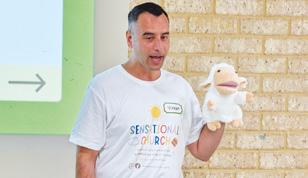
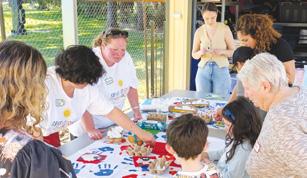

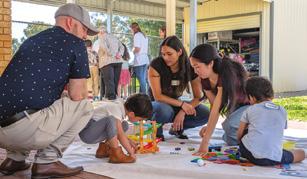
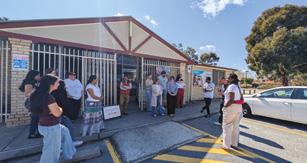

Sanitarium products named healthiest choices
Sanitarium’s Weet-Bix, UP&GO and So Good ranges have been recognised as some of the healthiest choices on supermarket shelves, achieving multiple wins at the 2025 Healthy Food Guide Awards across Australia and New Zealand.
The awards, judged solely on nutrition credentials by a panel of independent accredited practising dietitians and experts, celebrate products that genuinely deliver health benefits to consumers.
“We’re committed to producing delicious, versatile and nutritious products that support whole-person health and inspire healthy eating,” said Jessica Manihera, head of marketing and


communications for Australia and New Zealand. “The support of our customers in choosing our products to sustain them as part of their daily lives inspires us to keep raising the bar.”
Among the winners, Weet-Bix 1.2kg Value Pack was named Best Cereal in both Australia and New Zealand, while Weet-Bix Little Kids Essentials took out Best Kids Cereal in Australia and WeetBix Bites Wild Berry received the same honour in New Zealand. UP&GO No Added Sugar Vanilla won Best On-theGo Liquid Breakfast in both countries.
The So Good range of plant-based milk alternatives also achieved multiple wins.
Fulton transitions to university status
Sabeto, Fiji | Juliana Muniz
Fulton Adventist University College has received provisional approval to operate as Fulton Adventist University, marking a new chapter in the institution’s 120-year history.
The approval, granted by the Higher Education Commission Fiji (HEC) on October 3, allows the university to operate under its new status for six months while the Fulton Adventist University Bill progresses through parliament. The Commission will then reassess the university’s readiness for full recognition.
A ceremony held on October 8 at Fulton’s Sabeto campus (Nadi, Fiji) celebrated the milestone, attended by church leaders from across the Trans Pacific Union Mission (TPUM), Fulton staff and students, and HEC representatives. During the program, the institution’s iconic stone letters—previously reading FAUC—were symbolically updated to FAU to reflect the university’s new identity. Ratu Moape is currently the longest serving staff member at Fulton and was given the honour of removing the stones.
In his address, vice-chancellor Dr Ronald Stone described the transition as “a continuation of Fulton’s mission of education and service”.
HEC director Dr Eci Naisele congratulated the university, noting Fulton’s
long-standing contribution to higher education in Fiji. He explained that achieving university status is not easy, but Fulton not only met the required criteria, it also fulfils a specific need within Fiji’s higher education system. “There were consultations about whether another university was needed, but your vision and mission met a genuine need because there’s no clash with other universities,” said Dr Naisele.
Pastor Maveni Kaufononga, South Pacific Division vice president and former chair of the Fulton Board, said the change reflects years of dedication by many leaders and educators. “The future for FAU is bright, and I am confident it will continue to make a profound impact on students, the community and the Pacific,” he added.
TPUM education director Talonga Pita highlighted the milestone’s significance for Adventist education in the Pacific. “Fulton has been the educational hub of the Pacific islands for many years. Reaching university status will strengthen its role in training leaders grounded in God’s Word and committed to serving others.”
Fulton will celebrate its 120th anniversary from November 26 to 29, with a reunion event to reflect on the institution’s legacy and future direction.
Berkeley Vale, NSW | Record staff
The transition was celebrated with an event on October 8.
Award-winning breakfast favourites from Sanitarium’s Weet-Bix, So Good and UP&GO ranges.
Staff member Ratu Moape removed the “C” from Fulton Adventist University College’s campus sign as the institution officially became Fulton Adventist University.

“Adventist” back in school names
Brisbane, Qld | Tracey Bridcutt
All Adventist schools in the South Queensland Conference (SQC) will soon have “Adventist” back in their names.
Outgoing SQC education director Jack Ryan, who has been appointed national director for Adventist Schools Australia, said there are seven schools in the Conference—some already include “Adventist” in their names, while others will be expected to comply by the beginning of 2026. Branding for the schools will also be updated to align with the South Pacific Division style.
“A significant review of the Adventist brand in the early 2000s, when I was principal at Brisbane Adventist College, was a big moment for me because it provided a statistic that there were more Adventist churches in the Brisbane area than there were KFC outlets. In saying that however, we were totally invisible and the reason being is around branding,” Mr Ryan said.
According to Mr Ryan, many in the community remain confused about Adventists. “It seems that we’ve done a really good job of mystifying Seventh-day Adventism, so people don’t know who we are; people have all sorts of peculiar ideas about who Adventists are. Addressing this has been one of our main goals,” he said.
A Church Perceptions Study conducted in 2022 confirmed these concerns. It found that the Adventist Church—despite the positive work in education, health and community service—has a significant identity issue in Australia and New Zealand.
Mr Ryan said one of the other challenges has been a lack of understanding about effective marketing. “I think that we have previously misinterpreted marketing as promotion and so we’ve poured literally hundreds of thousands into glossy brochures, banners and bus wraps, but we’ve missed the opportunity to actually control the narrative,” he explained.
“So we’re now working much more intentionally in that space, so our branding is the same everywhere you go. At one point in time, we had the seven schools in our patch that had completely different names.
“So, now we’ve taken on the mantra ‘One school, seven campuses’; we’ve now got a unified learning framework across all our schools.”
South Pacific Division communication director Tracey Bridcutt welcomed the decision. “A unified brand not only strengthens our visibility but also highlights the positive contribution Adventist education is making in our communities,” she said.
making headlines
Transplant heroes
Pênfigo Adventist Hospital (HAP) received the “Friend of Transplant” Legislative Merit Award for its pioneering liver transplant program and contribution to saving lives in Mato Grosso do Sul, Brazil. In the past 12 months HAP has performed more than 50 surgeries and gained national visibility for its work.—SAD
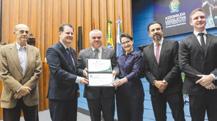
Sabbath spotlight
Millions of viewers were introduced to the Seventh-day Adventist understanding of the Sabbath when Pastor Ian Sweeney, field secretary for the Trans-European Division, was featured on the Songs of Praise show, one of the UK’s most recognised Christian programs. Broadcast live on BBC One, the episode explored the meaning and value of rest in a restless world.—TED
Little lights shine
Nearly 600 children gathered at the Monosapara Adventist Seminary and School in Bangladesh for the Children’s Bible Conference in September. The four-day program combined worship and fellowship through Bible challenges, outdoor activities and community outreach, concluding with 34 children deciding to be baptised.—NSD
Brain gut link
Early research from the University of South Australia found that bacteria in the gut can affect how the brain works, influencing mood, stress and behaviour. Their study suggests that simple changes like improving diet or using probiotics could become affordable ways to support better mental health.—UniSA
Some South Queensland schools already have “Adventist” in their names.

Hymns in your pocket
An Adventist musician has released a collection of public-domain hymns from the Seventh-day Adventist Hymnal, transposed for different musical instruments, as a series of Kindle books on Amazon Australia. Developed by Merian Richardson, the Transposed Hymns project gives church musicians instant access to familiar hymns in keys suited to their instruments. Originally launched five years ago on <transposedhymns.com>, the resource is widely used by musicians worldwide. Each Kindle edition enables instrumentalists to play together in ensembles or orchestras. Nine versions are available, covering piano and treble or bass-clef instruments in Bb, Eb, F and C keys.—Juliana Muniz
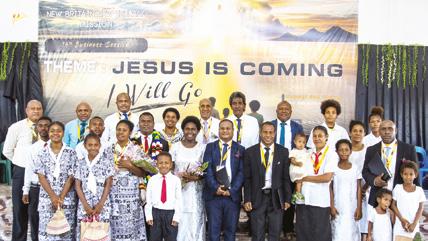
Ordination x 4
Four pastors were ordained to ministry ahead of the New Britain New Ireland Mission (NBNIM) business session on September 27. The service was held at Kulungi Seventh-day Adventist Church in West New Britain, with more than 1000 members, pastors, leaders and representatives from the Papua New Guinea Union Mission (PNGUM) in attendance. Those ordained were Bali-Vitu district director Pastor Ensa Waison, Bialla district director Pastor Ivoni Kemo, Talasea district director Joe Kamua, and NBNIM youth and family life director Pastor Bera Atahu. The ordination service was officiated by PNGUM ministerial secretary Pastor Daniel Ricky, who affirmed the faithfulness of the four pastors and charged them with their responsibilities. Representing the newly ordained, Pastor Kemo expressed gratitude on behalf of the group —Paul Bopalo
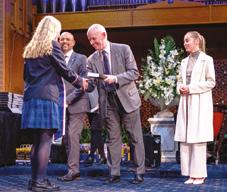
Bibles for graduates
Wahroonga Adventist Church (Sydney, NSW) leaders had the joy of presenting personalised Bibles to the graduating Year 12 students from Wahroonga Adventist School on September 23. Each Bible is embossed with the student’s name and includes a special message from the church. It’s a tradition that began when the school celebrated its first Year 12 graduates four years ago. “We hope that our students graduate from our school but not from our faith community,” said Wahroonga associate pastor Richie Reid. “There’s always a home here for them.”—Tracey Bridcutt

Youth on a mission
Pathfinders across North New Zealand celebrated World Pathfinder Day and the 75th anniversary of the ministry on September 20. The program included a youth-led worship service and community outreach, with clubs preparing food parcels for families in need and visiting retirement homes. Donations from Sanitarium supported the initiative.—Kelsey Ryan
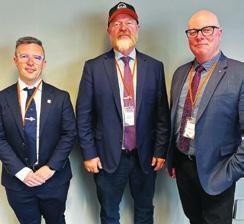
Same team, new term
Executive officers of the South New South Wales Conference (SNSW) were reappointed during its 87th session, held in Canberra (ACT) on September 28.
Pastor Justin Lawman will continue as president, with Calvin Drinkall as secretary and Caleb Williams as chief financial officer.
Pastor Lawman said he feels privileged to continue serving. “I quite enjoy working in South New South Wales. We have a fantastic pastoral team, and to see them grow and become more and more effective in mission is really exciting,” he said.
He is also excited about serving with the same team of officers. “We’re all quite different, so we make a pretty formidable team because we all bring something unique to the table,” Pastor Lawman said.
South Pacific Division vice president Pastor Maveni Kaufononga attended the one-day meeting and presented the opening worship.
The session focused on reports, vision casting and planning for the future. Looking ahead, Pastor Lawman highlighted church growth as a priority. “We are currently growing at 3.5 per cent, but we’d really love to see that closer to 10 per cent, under God, if that’s possible,” he explained. “The way we are doing that is by developing leaders rather than focusing on programs.”
Delegates also heard about plans to expand StormCo initiatives into weekly kids’ clubs and branch Sabbath schools in country towns, and to revitalise Adventist Community Services as a key public-facing ministry. —Juliana Muniz
have news to share?
Send info and photos to <news@record.net.au>
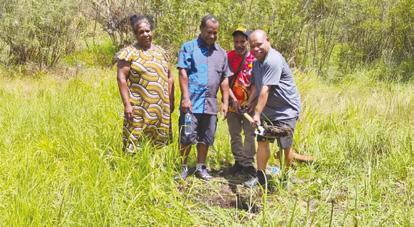
Breaking new ground
Two churches in Central Papua Conference held groundbreaking ceremonies to mark the start of relocation projects. Fifteen-Mile and Rouna Works Seventh-day Adventist churches will move to new sites to provide safer and more accessible worship spaces for their members. At Rouna Works, a family donated a block of land for the new church, while at Fifteen-Mile, relocation was prompted by the deterioration of the existing structure. Bisiatabu district director Pastor Jebulon Apua reminded attendees that “the sanctuary is a special place where heaven meets earth”. The ceremonies included prayers, singing and the symbolic turning of the soil.—Paul Bopalo

A home with history
A heritage-listed home near the South Pacific Division headquarters in Wahroonga, Sydney, is being restored by the Church’s property department. Built around 1915 to house staff, the four-bedroom Federation-style home had fallen into disrepair after being divided into two flats. “We felt it was fitting to recognise the past and preserve a piece of our heritage,” said Lorin Bradford, Division Property Trust manager. The renovation includes a new roof, veranda restoration and full interior refurbishment. Once complete, the property will be sold, with proceeds supporting The Quarters housing project for Avondale University nursing students and Sydney Adventist Hospital staff. “The Quarters will provide more affordable living for San workers and Avondale nursing students, thereby supporting the mission of these two entities,” Mr Bradford added.—Tracey Bridcutt
The
wedding florist

My daughter is a wedding florist. When she puts flowers together in a bouquet they are a work of art. You only get one wedding, right? So the flowers, like everything else, need to be the most glorious you’ve ever seen.
We live in Melbourne, Australia. It is cold right now. Nobody wants a cold wedding. Because, just like the flowers, you want the best weather you can get, and that’s not going to happen in August in Melbourne.
With no work for the month, my daughter decided to try a pop-up flower stand in a local shopping centre. So, the wedding florist showed up with flowers
and started making bouquets. Wedding bouquets. Because that’s what she does. And wow, the comments!
I sat in the flower stand for a few hours each afternoon that I could. “Are these flowers real?” was the most common question I got asked.
I would smile and say, “Yes! They are beautiful, aren’t they?” Then I would tell them about my daughter, the wedding florist, and why these flowers looked so much better than the flowers they were used to seeing. “A wedding florist shapes each flower,” I said, more than once.
One young couple walked by holding hands. She whispered to him, “You should buy me flowers!”
I wasn’t meant to hear it, but being single-sided deaf, I read lips very well. I said, “Yeah, he should!” They both turned around and burst out laughing.
An elderly lady walked up and said, “I need some flowers for my neighbour’s daughter. But I’m not sure if she will come past the house now that her mum has died.”
“When did your neighbour die?” I asked.
“Yesterday.”
“I’m sorry to hear that,” I said. “Did you know your neighbour well?”
She smiled warmly. “Oh yes, she moved in six years ago and we talked nearly every day!”
I paused and then said, “Your friend passed away yesterday. Are you okay?”
She looked up at me with a teary smile. “What a lovely question,” she said. “Yes, I’m okay. She’d been unwell for some time.”
I had so many great conversations during those afternoon shifts in the flower stand. Ladies, young and old, wanted to tell me about their weddings. Men wanted me to know they were once florists, had delivered flowers or had been married. And lots of people just wanted to be heard. Flowers slow people down. All beautiful things do.
One particular conversation with a man stands out. He was chatty but clearly uncomfortable. I was trying to read him, but getting odd signals. It was like he had something to say but wasn’t sure he could. Finally, he blurted, “I don’t usually say this, and I’m not sure how you’ll take it, but Jesus loves you.”
“I know!” I said and smiled. “Thanks for reminding me. Do you go to church nearby?”
Clearly relieved, he said, “Yes, I go to the church at the end of Hull Road. It’s called The Sanctuary.”
I laughed. “I go to the same church! I just go on the day before you.”
He looked confused and then said, “Oh! Are you a Seventh-day Adventist?”
I nodded and said, “I am, and there’s something I want you to know. Jesus loves you, too!”
I shared the story of this conversation during chapel at the Seventh-day Adventist school, located up the road from the church. When I said the line, “I go to the same
church. I just go on the day before you”, I met eyes with one of the teachers who also goes to church with me on Saturdays. She had the same confused look on her face as the man did. What was I missing?
It wasn’t until a few days later, when I was reading a book, that I realised how I was confusing people. In Reggie McNeal’s A Work of Heart, he describes a new mindset that is emerging in Christianity—actually a very old mindset—in which followers of Jesus see only two cultures: the Kingdom of God and the pre-Christian world. In a world where Jesus is largely unknown, there are only two kinds of people: those who know Jesus and those who do not. For the past 200 years, during the Christian and post-Christian era, the many denominations of Christianity have been in competition with each other, stealing sheep as often as they could. Many people who grew up in pre-millennial churches still have this mindset. But those of us Jesus people who see the apostolic pre-Christian world around us work together. And, as much as the world needs Jesus, we Jesus followers need each other!
On my final day manning the flower stall, I watched as a stooped elderly lady and her carer walked ever-so-slowly toward one side of the flower display. Finally, they reached the right front corner. Her eyes were downcast, fixed firmly on the seat of her walker as she pushed it along, shuffled step by shuffled step. I waited until she was directly in front of me, flowers all around her. “Hello!” I said cheerfully. She looked up slowly until our eyes met. “How are you today?” I asked.
“Not good at all,” she said.
“It’s been one of those days, has it?” I asked.
She nodded.
Then, with a joyful voice, I chirped, “But look! Flowers!” And I gestured as if doing a magic trick. She smiled and looked at the flowers, perhaps seeing them for the first time. Then I said, “We all have tough days, but flowers help.”
“True. They do,” she said. I looked up at her carer, perhaps her daughter, and she smiled back from behind watery eyes.
“They are free to look at,” I said, quietly. “Spend as long as you like.” She did. And then she looked back at the seat of her walker and continued shuffling through her day, hopefully a little happier having been with a Jesus follower and His flowers.
Today, I’m thinking about my daughter, the wedding florist, and how she shapes each flower. And I can’t help but think, isn’t this the work of every Jesus follower? We meet people every day, and in conversation, with time and care, we shape them lovingly in the beautiful image of their Maker.
Dave Edgren is a storyteller and writer living in Victoria, Australia.

Are Veggies Better For You when cooked?

A crisp salad or crunchy raw veggie snack can be refreshing, but sometimes cooking vegetables brings out more than just flavour. In many cases, some veggies are even better for you when cooked –unlocking extra nutrients and deeper flavour. Sanitarium accredited practising dietitian Rachel Moore explains.
Green Beans
Green beans show increased antioxidant activity when lightly cooked. Steaming or pan-frying helps preserve nutrients and improve digestibility, while heavy boiling can reduce their advantages. Stir-frying keeps them both tasty and nourishing.
Cruciferous Vegetables
Cruciferous vegetables—including broccoli, Brussels sprouts, cauliflower, kale and cabbage—also shine when cooked. Heat reduces compounds called glucosinolates that can cause bitterness, making these veggies milder and more appealing.
“You may have heard that cooking vegetables can destroy some of their nutrients—but that’s only part of the story. For certain veggies, cooking can increase the availability of nutrients like antioxidants and vitamins, making them easier for your body to absorb,” shares Rachel.
Here are some examples of vegetables that benefit from a little heat:
Tomatoes
Tomatoes are one of the best-known cases. Cooking boosts their lycopene content—a powerful antioxidant linked to heart health and reduced inflammation. Heat also increases flavonoids and phenolic compounds. These nutrients are heat stable, so they hold up in sauces or soups.
Mushrooms
Mushrooms are naturally nutrient-rich, and gentle cooking can lift their antioxidant levels even further. Adding them to risottos, stir-fries or soups is an easy way to enjoy their benefits.
Rachel’s favourite strategy for boosting veggie intake is simple: cook once, eat often.
“I like roasting a big tray of mixed vegetables at the start of the week—sweet potato, capsicum, carrots, onion, whatever’s on hand,” she says. “It makes it easy to add veg to meals through the week.”
Soups, broths and noodle dishes are another versatile way to build colour and variety into meals. “They’re perfect for using up whatever veg you have—and a great way to ‘eat the rainbow’ and clock up your plant points,” Rachel adds.
So, are veggies better for you when cooked?
Sometimes—but it depends on the vegetable, the cooking method and what you enjoy most.
“Ultimately, the healthiest vegetables are the ones you’re eating regularly,” Rachel says. “Raw, roasted, steamed or stir-fried—every extra serve is a win for your health.”



when we work together with Him. May all the praise and glory go to our wonderful Lord.
My partner in the work in Lata is elder John Peter Peniop, who works tirelessly for his people of the Santa Cruz Islands and believes the amount we raised will probably be sufficient to complete the whole project. They received a local donation of all the timber needed to build the pastor’s home and church.
Become a missionary church
In 2023 I wrote an article for Adventist Record about the Warragul church family who supported me so wonderfully in an appeal to raise money for the people in the Santa Cruz Island group of the Solomon Islands Mission. This group needed a range of equipment to conduct evangelical programs, and through the church’s generosity, we were able to supply these items— alongside eight boxes of Bibles, 4000 Spirit of Prophecy books and clothes. We also sent two water tanks for a community with no access to fresh water.

In 2023 our next ambitious project was to raise funds to help purchase land and build a pastor’s home and church in the port town of Dendu. The church needed to have a centre of influence and a visible presence in this busy port town to spread the gospel message. The amount needed was approximately $A35,000. It was our prayer that we could make a major contribution towards this amount. At the close of 2023, when all donations and pledges had been counted, the Warragul church had raised $23,180.
A sister church in Springwood (Qld)—responding to my appeal in Adventist Record for other churches to partner with us for this project—very generously raised $2800. We were so grateful for their support. We had another very generous outside donation of $5000 from a very kind sister from Tumbulgum church (North NSW), who heard about the project. We were overwhelmed with such wonderful support. The total raised was $30,980. An incredible effort from a small country church in Gippsland! What an amazing God we serve—all things are possible
Today, the pastor’s home is almost completed. There is a strong interest within the community to complete this project so that the resident pastor can be based there and support the growing church family. They are expecting more baptisms from Dendu and surrounding areas later in the year. Once the pastor’s home is built, they plan to start building the church.
During the years that the Warragul church has been partnering with the Santa Cruz Islands people, there have been several baptisms and many studying the Bible. It has been such a blessing for our church family to contribute to the growth of God’s kingdom in this part of the world. I would encourage other churches to become missionary churches—to share our abundance with those who need assistance and to spread the gospel and the three angels’ messages.
As a result of the success of the previous projects, Warragul church has embarked on two new projects. We want to raise funds to build a simple church structure to support worship in a new community school in Taipe. The community has asked for the Adventist education system to run the school for them. We pray that the church will be used by the families of the children as well.
The second project is to urgently raise funds to purchase land for an existing Adventist church school in Nela, which needs to be dismantled and relocated. We need to help them purchase this new land as soon as possible so the disruption to the children’s education is kept to a minimum.
The amount we need to raise is $25,000. The Lord has shown us that we can do anything when we work together with Him.
I once again invite other churches to join us in helping to finish God’s work, so we can all go home together. My email address is <lorrainejmitchell44@gmail.com>. If you would like any further information or would like to partner with us, please contact me.
Lorraine Mitchell (nee Henry) attends Warragul church in Victoria.

Learning to wait on God's timing
If you make a list of prophets from Scripture, this prophet will most likely be in the top five on everyone’s list; not necessarily because of what he prophesied, but because of what he did. A man mentioned by Jesus (Matthew 24:15) more than 500 years after his book was written. A man who had every excuse to turn his back on Jehovah, and yet remained faithful in all aspects of life. A man of God who was placed in the palaces of multiple world empires because of his “excellent spirit” (Daniel 5:10-12,14; 6:4). A true inspiration and comfort for all who have come after him. Yet, he was a human like us, with likes, dislikes, passions and aspirations. But he “purposed in his heart” (Daniel 1:8) to be fully devoted before the King of Kings, even if that meant going against another command from a human who was titled “king of kings”. Of course, I’m talking about Daniel.
The lessons we can gather from the lives of Daniel, Hananiah, Mishael and Azariah are just extraordinary, especially in the way they pertain to current and future events in our world today. They also demonstrate the way we can live in response to what God wants us to become:

His people. He wants to be our God that we should be His people (Jeremiah 31:31-34).
To cover the entire life of Daniel and see how God used him in just a couple of pages is too difficult, and we know the historical accounts from the first six chapters so well. So, we’ll talk about just one lesson from the prophetic section of Daniel—how it has encouraged me and, I pray, that it will encourage you too.
In the first year of Belshazzar, Daniel has his first vision, recorded in the seventh chapter. This is where Daniel sees four wild beasts coming out of the water and is confused by what he sees. He asks for what these things mean, but he doesn’t get a full explanation. There have been times in my life, and I’m sure in yours as well, where you have perplexing questions, which you ask God about, and God seems to not answer. “The secret things belong to the LORD our God” (Deuteronomy 29:29), but just because He doesn’t reveal something to us straight away, doesn’t mean that He doesn’t love us. There are times where we pray about something and it is only years later that we fully understand why God “reserved His right to respond”,
mostly because of our lack of understanding.
Think of a time where you have waited upon God for an answer, but it did not come straight away. What was your reaction? Did you argue with Him? Did you patiently wait for Him to respond? God cares about you so much that sometimes He does not respond, simply for the fact that we aren’t ready to receive the answer to our prayers. But be assured that those prayers are registered in heaven and God will respond in His time and in His way.
As someone who grew up in the Church, I read the stories of Daniel, admiring his steadfastness, his kindness, his attention to detail, and admiring the God who brought him through the situations we know so well. Daniel allowed God to use him because he completely trusted in Him, something we all must learn. God sometimes must bring us low before He can lift us up again. He did this for me a few years ago.

that He is faithful to you and wants you to be part of His people. We may wait for years, even decades, but God always has an answer. He won’t give up on you!
It’s amazing when on the outside somebody may seem to be “rock solid” in their faith, but on the inside, they are asking questions about “why God is allowing this to happen to me?” This is what happened to me a few years ago when God had to bring me into a valley when I least expected it. I argued with God about why He allowed certain things to not work out in my life. I would cry myself to sleep while praying and arguing about how things seemed so good and why God was allowing the foundation I thought He made to crumble. I got so frustrated with Him that I gave God an ultimatum: “If You don’t show Your love to me in the next 12 months, I’ll walk away and not come back.”
Looking back, I didn’t have anything to complain about. I had an amazing family, I was involved in work and at church, and yet there was something (or Someone) missing. The one thing that I am thankful I did do though, was give God a chance. Like Daniel, even though I didn’t have all the answers, I had to learn to wait on the LORD, and let Him deal with it (Psalm 27:14).
One day would pass to the next, one week to the next, one month to the next. Nothing seemed to change. But I’ve learned that when you are up to nothing, God is always up to something. My tear-soaked Bible became the most important book to me in that period of life—and it still is today. The times where I would sit by myself reading His Word, praying and seeing Him reveal Himself to me afresh were some of the best experiences of my life. There were times where, like Daniel, I would not understand why, but I knew that if God loved me, He would be faithful. At the end of those 12 months, I came out the other side so glad that I gave God that chance and that I didn’t give up my connection with Him. He proved that He loves me and that He is faithful (2 Timothy 2:13). That’s how I know that He loves you,
Daniel waited for two full years before receiving God’s answer to the first vision. Guess what? It’s another vision! Recorded in the eighth chapter of Daniel, this vision expands on the vision from the seventh chapter, but it leaves Daniel even more confused! He understands more about the little horn, but about the timeframe of the 2300 days, God tells him that this part is related to “many days in the future” (Daniel 8:26). Daniel can’t take it anymore. He faints and the vision ends. He was sick for many days, though he was still faithful in going about the king’s (and King’s) business. Even when we get an answer through God’s Word and testimonies which we do not like, we still have a choice to make. To trust Him (Proverbs 3:5,6; Isaiah 55:6-10), knowing that He will work all things out for His glory (Philippians 2:13; Romans 8:28), or to walk away. Daniel decides to stick with God. He decides to still make Jehovah his God, even when he doesn’t understand everything that God has shown him.
There is a reason why God did this: So that we, living in the time when the little book of Daniel is unsealed (Daniel 8:26;12:9; Revelation 10:8-11), can read it, understand it and pair it with its twin: Revelation. Beautiful doctrines that reveal God’s love like His work in the heavenly sanctuary, the investigative judgement, the first and second coming of Jesus, when unpacked biblically, show us how God is still wanting “whosoever will” (John 3:16) to come and be part of His people (2 Peter 3:9). As an old commercial said, “Taste them again, for the first time.” Let Daniel speak, and discover how much God loves you and longs for you to be in heaven with Him (Daniel 12:13).
John Duncan is a teacher at Mountain View Adventist College and attends Castle Hill Adventist church (NSW).
Conversations
Obscuring the simplicity
I read with interest the article titled, “Can we use gluten-free bread in the communion service?” (Feature, October 4) and wondered why one would think this question needed to be asked. The emblems used in Passover (and subsequently the Lord’s Supper) were common food items in the geographical areas of both Egypt and Palestine. They were everyday items of food, which when used for the Passover feast or the Lord’s Supper, were given symbolic significance for a defined purpose. In world geographical areas where these same items of food are not readily available, people have to use what is available locally in order to enable communion to be celebrated. The “flour” may often be finely ground coconut or sago palm, or even thinly sliced and dried tubas such as taro or tapioca. Similarly, because grape juice is frequently not readily available, the water from a green coconut is used. However, the author of the article is correct in saying there is no biblical recipe to follow.
I also noted the reason given for the use of unleavened bread and looked unsuccessfully for a biblical reference to leaven being a symbol of sin. In reality, nowhere in Scripture is
leaven used as a symbol of sin per se. Jesus did refer to leaven in warning against the self-righteous attitude of the Pharisees, which, if allowed to reside in one’s mind, would work like leaven to influence one’s lifestyle and actions in an undesirable way.
In the same way, Jesus spoke of leaven as a symbol of God’s kingdom, the principles of which, if residing within us, will influence our lifestyle and behaviour towards godliness. What is clear is that in Scripture, leaven regularly symbolises a silent, permeating influence—for good in the kingdom parable (Matthew 13:33), but towards godlessness under the corrupting effects of such things as Pharisaic attitudes in the life.
It is also interesting to note that when Jesus described Himself as “The bread of life” (eg. John 6:35) He used the Greek word artos, which is the word for daily eaten common leavened bread, not the word azymos, which is the Greek for unleavened bread. We can also reflect on Paul’s words: “God made Him who had no sin to be sin for us . . .” (2 Corinthians 5:21 NIV). Yes, though it pained Him terribly, God dealt with His Son as a sinner.
It is too often unfortunate that in defining and requiring what we (often
mistakenly) believe are significant details of Scripture, we obscure the simplicity and beauty of the principle of what God is saying to us and doing for us.
Frank Dyson, NSW
From the socials
“Help, I don’t want to go to church” social media reel Facebook comments
Wendy Heywood McMahon
Our priority needs to be looking after our existing members before we invite others to a place of hypocrisy. Our care needs to focus on those members we already have and then they will be equipped and motivated to help others. In particular, mental health/trauma recovery which most people don’t realise is the cause of their hardened hearts.
David Johnson
It’s all about discipleship, mentoring and following up people to build connection, to hold them so they find their place.
There are a lot of churches I wouldn’t dream of inviting a new person to as they are not healthy churches.

Did God command GENO



Famous atheist Richard Dawkins once claimed that the God of the Old Testament (OT) is “a vindictive, bloodthirsty ethnic cleanser; a misogynistic, homophobic, racist, infanticidal, genocidal . . .” People who reject God for whatever reason feel justified in their position by such characterisations of God. The reality is that the God of the OT is the complete opposite of what Dawkins thinks He is. In fact, He is no different to the God of the New Testament (NT).1 Jesus is the exact expression of God. He said, “If you have seen Me, you have seen the Father” (John 14:9). According to the NT, Jesus was the God who brought the Israelites out of Egypt and led them into Canaan (Jude 5;1 Corinthians 10:4,9). So, how do we deal with the conquests of Canaan, which God ordered the Israelites to undertake?
To begin, we need to understand literary context. When we come across media, we naturally adjust our interpretation of it according to its genre and the figures of speech used. For example, if someone reported that every man and his dog were at Big Camp, we would understand that to mean that there were a lot of people there, including both men and women, but probably no dogs, and certainly not every man. We would understand a sports report that stated Team A annihilated Team B to mean that Team A had a decisive victory over Team B, without any fatalities.
The same applies to the Bible. We need to adjust to the various genres and figures of speech. Even the most fundamentalist Christian does not interpret everything literally. For example, when Jesus called King Herod a fox (Luke 13:31,32), everyone understands that this is not to
be taken literally. If Jesus Himself used figures of speech, should we expect anything different from the inspired authors of the Bible? It quickly becomes evident that the Bible is the word of God in human words and concepts. When it comes to ancient Israel’s conquest of Canaan, it is important to make the correct interpretive adjustments that take genre and figures of speech into account. Understanding how things were communicated in the ancient Near East (ANE) sheds light on our understanding of the Bible. Research reveals that hyperbole was very much a feature of the ANE war genre. For example, when Tiglath-Pileser I, King of Assyria, recorded his victories, he claimed to have raided the area from Suhi to Carchemish in one day.2 The distance between these two locations is over 500km! He could not have travelled that distance in one day, let alone raided it. When Pharaoh Merneptah attacked the Levant, he claimed, “Israel is laid waste, his seed is not.”3 King Mesha of Moab also recorded, “Israel perished forever.”4 Both kings were obviously exaggerating their decisive victories over Israel, as neither one of them annihilated Israel (literally).
It is no surprise that the biblical text records warfare in a similar way. Reading it literally without adjusting for exaggeration creates contradictions in the text. For example, how can Jeremiah say that Moab will be destroyed from being a people and then a few verses later declare that Moab will be restored (Jeremiah 48:42,47)? When we examine the Canaanite conquests, the same adjustment needs to be made to harmonise all the verses. For example, God promised to annihilate the Amalekites, and
CIDE?


two verses later, Moses interprets that to mean that God will wage war with them from generation to generation (Exodus 17:14,16). Indeed, the Amalekites pop up time and time again throughout the history of Israel after being “annihilated” many times over (eg. 1 Samuel 27:8,9). Other examples of hyperbole include Deuteronomy 7:2, where it says that the Israelites were to annihilate the Canaanites, and yet in the very next verse, God forbids them to intermarry with them. One cannot marry a dead person. Joshua 10:20 says that the Israelites killed the Amorites until they were consumed, yet there were survivors who escaped. Joshua 10 also records how Joshua annihilated the people of Hebron, Debir and Gaza, yet the next chapter reveals that there were people still living there (Joshua 11:21,22).
At one point, it records that Joshua took the whole land according to all that God had commanded (verse 23), yet two chapters later, God tells Joshua that there is still a lot more of Canaan to be possessed (Joshua 13:1). Moving forward in time from the Canaanite conquest, we see that hyperbole was still a feature of the war genre. During the civil war in ancient Israel, it was commanded that all the men, women and children of Jabesh-Gilead be slain. However, the next verse interprets what was really meant by that command, and it did not include everyone, certainly not the children (Judges 21:10,11). After David killed Goliath, the women sang that Saul had killed his thousands, and David tens of thousands (1 Samuel 18:7). There is no record of the young David having killed anyone other than Goliath up until this point. This makes the record off by a factor of ten thousand if interpreted literally. Yet,
this is nothing compared to the figure given for the army of Canaanites that the Israelites fought with during the conquests. Joshua 11:4 records that they numbered like the sand of the seashore. Howard McAllister from the University of Hawaii made a rough calculation of the number of grains of sand on the world’s beaches. He estimated it to be 7.5 x 1018 grains of sand.5 This makes the biblical record of the number of Canaanites off by a factor of 7.5 quintillion times (if interpreted literally)!
But why did God reject King Saul for failing to annihilate the men, women, children and babies, together with the ox, sheep, camel and donkeys of the Amalekites (1 Samuel 15:3)? The prophet Samuel confronted Saul and said, “why do I hear the lowing of oxen and bleating of sheep (verse 14)?” Out of all the wrongs that one could have committed, failing to kill animals seems trivial. Is there something more going on here? Verse 8 tells us that Saul did fulfil the command to annihilate the Amalekites, yet they resurfaced again as a people. From this, we see that both the command to destroy the Amalekites and the report of the fulfilment of the command use hyperbole, which, as already noted, was common in the war genre of the ANE. Saul basically had a decisive victory over the Amalekites. Verse 12 specifies the actual problem, and it was that Saul had erected a monument to himself. Saul basically took the credit for the victory over the Amalekites. Not only that, he made their king, Agag, a vassal. In the ANE, once a treaty was ratified, the overlord would typically erect a monument in the territory to glorify the overlord king and mark that the region belonged to him. This meant that Saul was

going to support the Amalekites so that he could receive a good tribute from them. Essentially, this monument shows that Saul did the opposite of what God commanded and that he glorified himself. This explains why Samuel defines Saul’s sin as rebellion and idolatry (verse 23). Samuel corrected the problem by killing King Agag. He did not kill the animals as they were not the problem.
We have observed that interpretive adjustments are necessary when examining warfare in the Bible. People used figures of speech and exaggerations in similar ways to us today. The obvious fact that God is not xenophobic is confirmed many times. For example, Joshua blessed the Israelites as well as the foreigners who were among them who also followed God (Joshua 8:35). Conversely, the same decisive action that was taken to put a stop to the evil propagated by the Canaanites was taken against Israel when they practised the same evils (Joshua 23:16). And if we think that God only gave the Israelites land, Deuteronomy 2:9 tells us that God gave land inheritance to the other nations too. Also, Amos 9:7 tells us that God not only delivered Israel out of Egypt but also the Philistines from Caphtor and the Syrians from Kir.
Noticing hyperbole in biblical warfare accounts does not imply that the entire Bible should be read figuratively. Careful attention to genre is crucial. For example, the creation of this world is expressed poetically in the Psalms. It is presented very differently in Genesis, which bears all the genre markers of literal historical narrative.
So why did the Canaanites need to be subdued? Unfortunately, they practised a lot of evils, which included ritual physical and sexual abuse. They even sacrificed babies to their pagan gods. God mercifully waited for the Canaanites to change before taking decisive action against them (Genesis 15:16). Rather than being genocidal, Israel had a reputation for being merciful (1 Kings 20:31). Just as cancer needs to be stopped before it spreads, God was
obligated to put a stop to their evils. If He did not, God would be guilty of negligence, and true love is not negligent. Ironically, the same people who mischaracterise God as bloodthirsty reject Him due to the presence of evil in this world. In their mind, God cannot exist because He judges people harshly, yet they simultaneously claim that God cannot exist because, if He truly did, He would take action against evil. Adding to this paradox is the claim that the categories of good and evil themselves are merely subjective human constructs.6
Upon closer examination, we see that God did not order genocide. The Bible is the word of God in human language. Literary genres and figures of speech must be taken into account if we are to interpret God’s Word correctly. Once this is done, we see that the God of the Bible is abundant in mercy and takes the difficult and necessary measures needed to stem the tide of evil. This is exactly what true love does.
1. The warnings of Jesus in the Gospels and the Revelation of Jesus Christ reveal that the limited and local judgements of the OT are much greater in the NT in that they are global in scale and eternal.
2. The Annals of Tiglath-Pileser I (1,100 BC).
3. Merneptah Stele (1,200 BC).
4. Mesha Stele (840 BC).
5. <https://web.archive.org/web/20120222113647/http://www. hawaii.edu/suremath/jsand.html>
6. E.g. “The universe . . . (has) no design, no purpose, no evil, no good, nothing but pitiless indifference.” —Richard Dawkins, River Out of Eden: A Darwinian View of Life (1995), 95.
Emanuel Millen is a lecturer in Biblical Studies at Avondale Seminary.
Advertising
BIRDWOOD 70TH ANNIVERSARY
Birdwood Seventh-day Adventist church, South Australia will be celebrating its 70th anniversary on November 22 this year. All past ministers, members, attendees and friends of Birdwood church are invited to join us to celebrate this wonderful event with a church service beginning at 11:30am at the church, 13-15 Olivedale St, Birdwood. Pastor Andrew Kingston will be our special guest speaker for the day.
STUDY THE ADULT SABBATH SCHOOL LESSON YOUR WAY
Accessible formats for vision loss (large print, audio CD, app, YouTube, podcast, and braille) or hearing loss (Hope SS captioned). Contact CVHS on +61 (0)2 9847 2296 or email <cvhs@adventistmedia.org.au>
ABSOLUTE CARE FUNERALS
The Adventist family owned and operated business, caring for you from Sydney to Newcastle and Wollongong. Contact Arne Neirinckx, who understands our Adventist philosophy. Contact us on 1300 982 803 or 0408 458 452 or <arne@ absolutecarefunerals.com.au>, even if you have already paid for your funeral.
RECORD QUANTITIES
Is your church receiving the correct number of Record magazines? Adjust your numbers by notifying Kelli Geelan at <subscriptions@record.net.au> or on +61 (03) 5965 6300.
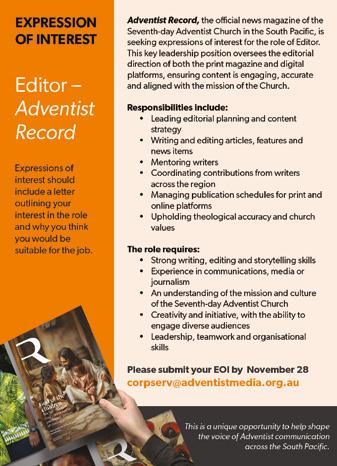





NOTE: Neither the editor, Adventist Media, nor the Seventh-day Adventist Church is responsible for the quality of goods or services advertised. Publication does not indicate endorsement of a product or service. Classified advertisements in Adventist Record are available to Seventhday Adventist members, churches and institutions only. All advertisements, appreciation, anniversary, wedding and obituary notices may be submitted via <ads@record. net.au> or online at <record. adventistchurch.com>. Notices will not be reprinted unless there is an error of fact caused by Record staff.
Are you a woman who is currently studying or interested in studying ministry at Avondale University or Mamarapha College?
Apply now for the Australian Union Conference Women in Pastoral Ministry (WiPM) Scholarship!
Applications close 16 January, 2026
abn 59 093 117 689 vol 130 no 21
Consulting editor
Glenn Townend
Editor
Jarrod Stackelroth
News editor
Juliana Muniz
Assistant editors
Ashley Jankiewicz
Danelle Stothers
Copyeditor
Tracey Bridcutt
Graphic designer
Theodora Pau’u
Noticeboard
Julie Laws Letters editor@record.net.au
News & photos news@record.net.au
Noticeboard ads@record.net.au
Subscriptions subscriptions@record.net.au + 61 (03) 5965 6300
Mailed within Australia and New Zealand
$A60.00; $NZ90.00 Other prices on application
Website record.adventistchurch.com
Mailing address
Adventist Media Locked Bag 1115 Wahroonga NSW 2076 Australia + 61 (02) 9847 2222
Cover credit
Maryellen Hacko
Next issue
Adventist Review November 15


